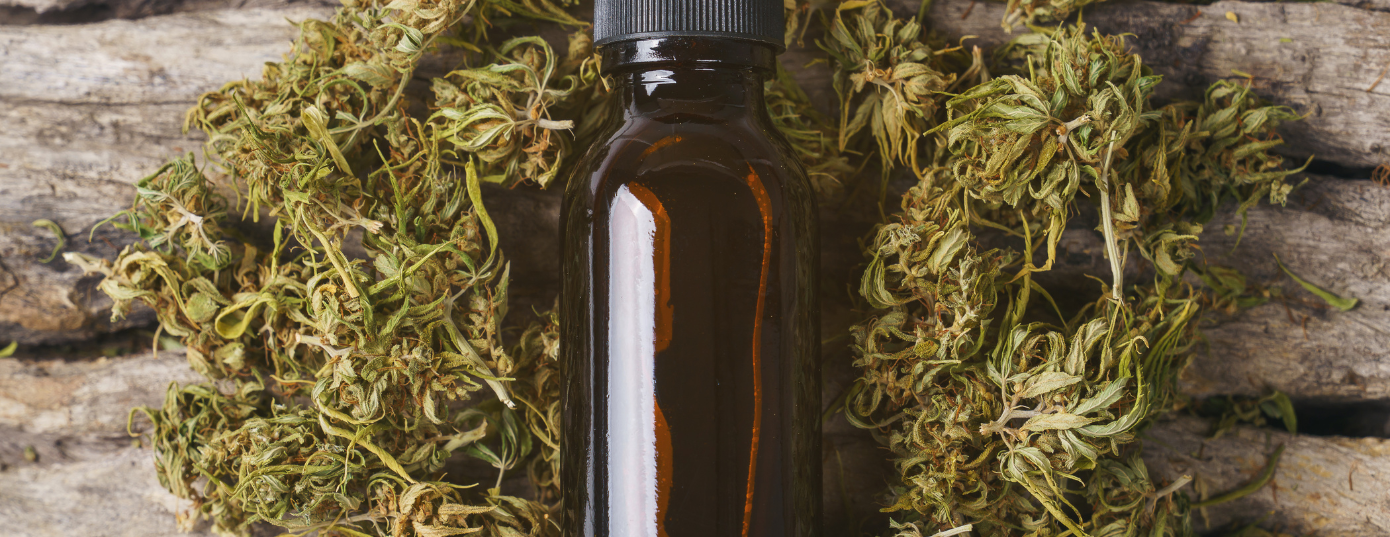Dear stoner: Meet your best friends cannabidiol (CBD) and tetrahydrocannabinol (THC), the main two compounds that are present in your favorite plant. Both of them have different effects on the human body and mind. By now you’re probably familiarized with THC, but have you heard about the wonders of CBD?
From infused gummies, to creams for pain relief, and even dietary supplement capsules, CBD is making its way into the global market fast. And since it doesn’t give you a high like THC does, CBD has been a little bit more welcomed with open arms by the general public.
In this article we’ll answer all the buzzing questions about cannabidiol, the differences and similarities it shares with THC, and more.
CBD & THC Explained
CBD is short for cannabidiol, and it is the second most prevalent chemical compound found in the cannabis plant. History tells us it was first discovered in the 1940s by American organic chemist Roger Adams; this man and his colleagues isolated cannabidiol from a cannabis sativa plant, differentiating the compound from the well known THC. Thirty years later, an Israeli team of scientists led by Raphael Mechoulam found that cannabidiol and other cannabinoids are not psychoactive. This huge discovery kickstarted researches about CBD’s medicinal properties, expanding later onto dietary supplements and even cosmetics.
According to American Chemical Society, biologists have been working on developing marijuana strains that suppress THC content and enhance the production of cannabidiol—for medical and other purposes. Science tells us that CBD can be extracted from both hemp or marijuana; Very Well Mind affirms that hemp-derived CBD contains trace amounts of THC, while marijuana-derived CBD from sativa strains may contain more.
Moving on to delta-9-tetrahydrocannabinol –THC for short–, is the main psychoactive ingredient in cannabis. This means that THC activates the mind and has an effect on our brain for a certain period of time, affecting mental processes like our perception, consciousness, cognition, mood and emotions. THC also activates the brain’s reward system by signaling the release of the brain chemical dopamine, says Very Well Mind.
Both CBD and THC can be smoked, but they are also found as ingredients in food recipes (AKA edibles), capsules, oils, etc.
Weed Strains
Cannabis is divided into two main categories: cannabis indica and cannabis sativa. These are different breeds of cannabis, modified to have specific effects between the spectrum of euphoria and relaxation. There’s also a third category, which is a mix of both indica and sativa—this is called hybrid weed.
Talking about strains is important because both CBD and THC are naturally present in the three cannabis plants; however, they contain varying levels of cannabinoids in order to feel the spectrum effects. Usually, a cannabis indica strain will have more CBD than THC, so the strain will lean toward feelings of relaxation and not euphoria. Cannabis sativa is quite the opposite, since they will usually have more THC than CBD. Finally, if a person takes a CBD dominant version of medical cannabis, they’re most likely to be consuming it from the hemp plant, which has up to 0.3% THC; this will not get them high.
In fact, Medical News Today affirms that the main difference between hemp and other cannabis plants is their amount of THC. As it was mentioned before, cannabis sativa plants with less than 0.3% THC are called hemp. In the United States, a 2018 Farm Bill stated hemp as legal in various states, while many countries around the world like China, India and Estonia have legalized hemp before 2018.
Nowadays, cannabis’s potency really has gone up. A 2016 study mentioned in Medical News Today found that the average potency of cannabis plants rose from roughly 4% THC in 1995 to 12% THC in 2014. From 2001 to 2014, the average CBD levels decreased from 0.28% to less than 0.15%.
Is CBD Psychoactive?
In other words: will CBD get me high?
As a matter of fact, experts are not entirely sure how CBD interacts with our brain receptors, Medical News Today shares. What they do know though is that CBD binds differently to THC in our brain, so it doesn’t produce the same high that is associated with smoking a joint or eating a brownie edible. Naturally, these products have a lot more THC in them.
The bottomline is the following: Even though CBD and THC have similar chemical structures, they don’t have the same psychoactive effects—which is to say that CBD will not get you high.
CBD vs. THC
The following comparison is brought by Medical News Today; this chart summarizes in general most of the differences between the main two compounds found on cannabis.
|
Characteristics |
CBD |
THC |
|
Produces a high or psychoactive reaction |
No |
Yes |
|
Interacts with endocannabinoid system |
Yes |
Yes |
|
Has side effects |
Some |
Yes (more accurately, psychoactive effects) |
|
Shows up on drug tests |
Potentially |
Yes |
|
Relieves pain |
Yes |
Yes |
|
Reduces nausea |
Yes |
Yes |
|
Eases migraine |
Yes |
Yes |
|
Reduces anxiety |
Yes |
Yes |
|
Eases depression |
Yes |
No |
|
Decreases seizures |
Yes |
No |
|
Has anti-inflammatory properties |
Yes |
Yes |
|
Helps with insomnia and other sleep disorders |
Yes |
Yes |
|
Helps with psychosis |
Yes |
No |
|
Increases appetite |
No |
Yes |
CBD & Its Legal Status
Cannabidiol’s legal status is all over the place. In regards to the United States, CBD is not legal in every state. The law knows it is not a psychoactive substance, but their policies are not updated on this rich substance. According to Very Well Health, in order for CBD to be legal in the state, it needs to be legal at both federal and state level. The 2018 Farm Bill sure helped when some states legalized hemp, but there’s still quite a lot to do in regards to CBD.
Hemppedia affirms that the legality of cannabis oil for medical use or as a dietary supplement in Europe, in general, varies by country. For example, the cultivation of the cannabis sativa plant is officially legal in the European Union, on the strict conditions that the breeders are registered in the EU’s Common Catalog of Varieties of Agricultural Plant Species and that the THC content in the plant does not exceed a concentration of 0.2 % (hemp).
Around the world, CBD oil is legal in Australia, Bulgaria, Canada, France, Greece, Japan, United Kingdom, and other countries.
CBD: Medical Benefits & Side Effects
There’s a lot of talk about the medical benefits and positive side effects that CBD brings into the table. However, since CBD is not entirely legal around the world, there’s not a lot of medical research or experiments put into practice. The bottomline is that research is still needed in order to determine the potential effects and benefits of CBD, as it is with different cannabis products.
Gathered from a few researches mentioned by Very Well Mind, here’s some potential benefits from CBD:
Epilepsy
A large-scale study made in 2017 and published in N Engl J Med in 2020, found that CBD for the treatment of pediatric epilepsy reduced the frequency of seizures by more than 50% in 43% of the patients with Dravet syndrome.
As a matter of fact, the The Food and Drug Administration (FDA) in the United States recently approved a cannabis-derived medication containing CBD and Epidiolex to treat certain childhood seizure disorders.
Anxiety
Anxiety disorders affect about an estimated 19.1% of U.S. adults each year; luckily, CBD is presumed to help ease the symptoms.
A 2015 study published in Neurotherapeutics specifically analyzed the existing preclinical studies on the use of CBD for anxiety. The results found that this compound was actually effective for numerous anxiety conditions like generalized anxiety disorder, obsessive-compulsive disorder (OCD), panic disorder, social anxiety disorder and post-traumatic disorder (PTSD).
As usual, further research needs to be conducted in order to determine the long-term benefits for all potential patients.
Depression
The interest in alternative methods for treating depression has been on the rise in recent years. Cannabidiol does not appear to increase serotonin levels, but a 2018 study found that CBD affects how the brain responds to the serotonin that is already present in the body, meaning that CBD could have antidepressant-like features. Of course, further investigations are still needed.
Sleep Difficulties
It is no surprise that CBD has the potential to help the people who have trouble doing so. Since CBD holds a calming effect, it’s a great remedy for this disorder. Getting enough sleep is also crucial for humans to function in their everyday life; sleep disorders are linked to health conditions such as depression, type 2 diabetes, obesity, and heart disease.
Back in 2019 The Permanente Journal published a study conducted with adults who had symptoms of anxiety and sleeping disorder. After taking 25mg of CBD daily for a month, research found that 65% of the study subjects experienced improvements in sleep quality. Still, more research needs to be done.
With so many benefits yet to be discovered, the world of cannabis is a very promising treasure chest. The fact that governments around the world are still running away from it is very disappointing; how much longer will this plant hold answers while the law keeps shutting out research, studies and experiments that will most likely bring wonders for the people who need it the most? If you want to find new ways to consume CBD and THC you can try some kratom a new and amazing consumption method.
Author: Mary Jane
American Chemical Society (2017) Molecule of the Week Archive: Cannabidiol. Retrieved from https://www.acs.org/content/acs/en/molecule-of-the-week/archive/c/cannabidiol.html#:~:text=In%201940%2C%20the%20iconic%20organic,called%20%E2%80%9CMinnesota%20wild%20hemp%E2%80%9D.
Cherry, K. (2022) CBD vs. THC: What's the Difference? Very Well Mind. Retrieved from https://www.verywellmind.com/cbd-vs-thc-differences-benefits-side-effects-legality-5071416
Cherry, K. (2020) 5 Mental Health Uses for CBD. Very Well Mind. Retrieved from https://www.verywellmind.com/mental-health-uses-for-cbd-4844875
Fletcher, J. (2022) A comparison of CBD and THC. Medical News Today. Retrieved from https://www.medicalnewstoday.com/articles/325871
Healthline (2022) CBD vs. THC: What’s the Difference? Retrieved from https://www.healthline.com/health/cbd-vs-thc
Herndon, J.R. (2022) Key Differences to Know About CBD vs. THC. Very Well Mind. Retrieved from https://www.verywellhealth.com/cbd-vs-thc-5272060


0 comments